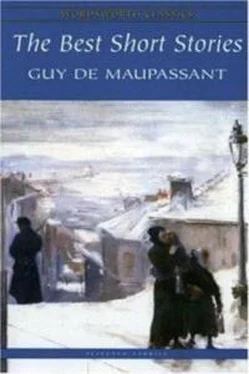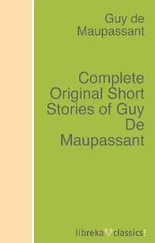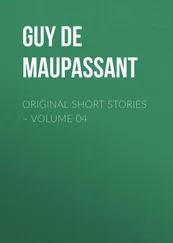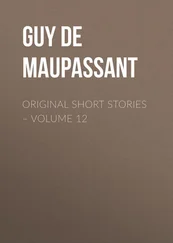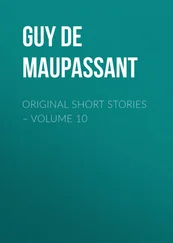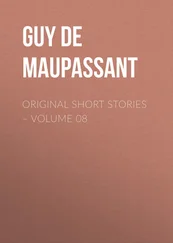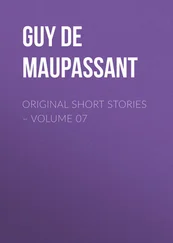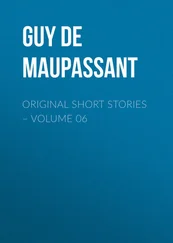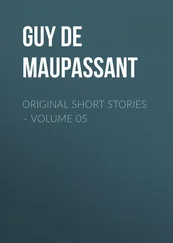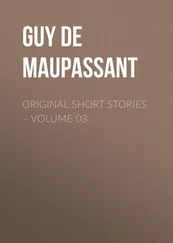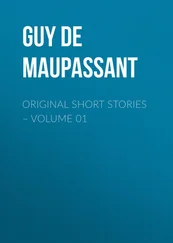Complete Original Short Stories of Guy De Maupassant
Guy de Maupassant
Preface
Guy De Maupassant―a Study by Pol. Neveux
"I entered literary life as a meteor, and I shall leave it like a thunderbolt." These words of Maupassant to Jose Maria de Heredia on the occasion of a memorable meeting are, in spite of their morbid solemnity, not an inexact summing up of the brief career during which, for ten years, the writer, by turns undaunted and sorrowful, with the fertility of a master hand produced poetry, novels, romances and travels, only to sink prematurely into the abyss of madness and death…. .
In the month of April, 1880, an article appeared in the "Le Gaulois" announcing the publication of the Soirees de Medan. It was signed by a name as yet unknown: Guy de Maupassant. After a juvenile diatribe against romanticism and a passionate attack on languorous literature, the writer extolled the study of real life, and announced the publication of the new work. It was picturesque and charming. In the quiet of evening, on an island, in the Seine, beneath poplars instead of the Neapolitan cypresses dear to the friends of Boccaccio, amid the continuous murmur of the valley, and no longer to the sound of the Pyrennean streams that murmured a faint accompaniment to the tales of Marguerite's cavaliers, the master and his disciples took turns in narrating some striking or pathetic episode of the war. And the issue, in collaboration, of these tales in one volume, in which the master jostled elbows with his pupils, took on the appearance of a manifesto, the tone of a challenge, or the utterance of a creed.
In fact, however, the beginnings had been much more simple, and they had confined themselves, beneath the trees of Medan, to deciding on a general title for the work. Zola had contributed the manuscript of the "Attaque du Moulin," and it was at Maupassant's house that the five young men gave in their contributions. Each one read his story, Maupassant being the last. When he had finished Boule de Suif, with a spontaneous impulse, with an emotion they never forgot, filled with enthusiasm at this revelation, they all rose and, without superfluous words, acclaimed him as a master.
He undertook to write the article for the Gaulois and, in cooperation with his friends, he worded it in the terms with which we are familiar, amplifying and embellishing it, yielding to an inborn taste for mystification which his youth rendered excusable. The essential point, he said, is to "unmoor" criticism.
It was unmoored. The following day Wolff wrote a polemical dissertation in the Figaro and carried away his colleagues. The volume was a brilliant success, thanks to Boule de Suif. Despite the novelty, the honesty of effort, on the part of all, no mention was made of the other stories. Relegated to the second rank, they passed without notice. From his first battle, Maupassant was master of the field in literature.
At once the entire press took him up and said what was appropriate regarding the budding celebrity. Biographers and reporters sought information concerning his life. As it was very simple and perfectly straightforward, they resorted to invention. And thus it is that at the present day Maupassant appears to us like one of those ancient heroes whose origin and death are veiled in mystery.
I will not dwell on Guy de Maupassant's younger days. His relatives, his old friends, he himself, here and there in his works, have furnished us in their letters enough valuable revelations and touching remembrances of the years preceding his literary debut. His worthy biographer, H. Edouard Maynial, after collecting intelligently all the writings, condensing and comparing them, has been able to give us some definite information regarding that early period.
I will simply recall that he was born on the 5th of August, 1850, near Dieppe, in the castle of Miromesnil which he describes in Une Vie….
Maupassant, like Flaubert, was a Norman, through his mother, and through his place of birth he belonged to that strange and adventurous race, whose heroic and long voyages on tramp trading ships he liked to recall. And just as the author of "Education sentimentale" seems to have inherited in the paternal line the shrewd realism of Champagne, so de Maupassant appears to have inherited from his Lorraine ancestors their indestructible discipline and cold lucidity.
His childhood was passed at Etretat, his beautiful childhood; it was there that his instincts were awakened in the unfoldment of his prehistoric soul. Years went by in an ecstasy of physical happiness. The delight of running at full speed through fields of gorse, the charm of voyages of discovery in hollows and ravines, games beneath the dark hedges, a passion for going to sea with the fishermen and, on nights when there was no moon, for dreaming on their boats of imaginary voyages.
Mme. de Maupassant, who had guided her son's early reading, and had gazed with him at the sublime spectacle of nature, put, off as long as possible the hour of separation. One day, however, she had to take the child to the little seminary at Yvetot. Later, he became a student at the college at Rouen, and became a literary correspondent of Louis Bouilhet. It was at the latter's house on those Sundays in winter when the Norman rain drowned the sound of the bells and dashed against the window panes that the school boy learned to write poetry.
Vacation took the rhetorician back to the north of Normandy. Now it was shooting at Saint Julien l'Hospitalier, across fields, bogs, and through the woods. From that time on he sealed his pact with the earth, and those "deep and delicate roots" which attached him to his native soil began to grow. It was of Normandy, broad, fresh and virile, that he would presently demand his inspiration, fervent and eager as a boy's love; it was in her that he would take refuge when, weary of life, he would implore a truce, or when he simply wished to work and revive his energies in old–time joys. It was at this time that was born in him that voluptuous love of the sea, which in later days could alone withdraw him from the world, calm him, console him.
In 1870 he lived in the country, then he came to Paris to live; for, the family fortunes having dwindled, he had to look for a position. For several years he was a clerk in the Ministry of Marine, where he turned over musty papers, in the uninteresting company of the clerks of the admiralty.
Then he went into the department of Public Instruction, where bureaucratic servility is less intolerable. The daily duties are certainly scarcely more onerous and he had as chiefs, or colleagues, Xavier Charmes and Leon Dierx, Henry Roujon and Rene Billotte, but his office looked out on a beautiful melancholy garden with immense plane trees around which black circles of crows gathered in winter.
Maupassant made two divisions of his spare hours, one for boating, and the other for literature. Every evening in spring, every free day, he ran down to the river whose mysterious current veiled in fog or sparkling in the sun called to him and bewitched him. In the islands in the Seine between Chatou and Port–Marly, on the banks of Sartrouville and Triel he was long noted among the population of boatmen, who have now vanished, for his unwearying biceps, his cynical gaiety of good–fellowship, his unfailing practical jokes, his broad witticisms. Sometimes he would row with frantic speed, free and joyous, through the glowing sunlight on the stream; sometimes, he would wander along the coast, questioning the sailors, chatting with the ravageurs, or junk gatherers, or stretched at full length amid the irises and tansy he would lie for hours watching the frail insects that play on the surface of the stream, water spiders, or white butterflies, dragon flies, chasing each other amid the willow leaves, or frogs asleep on the lily–pads.
Читать дальше
